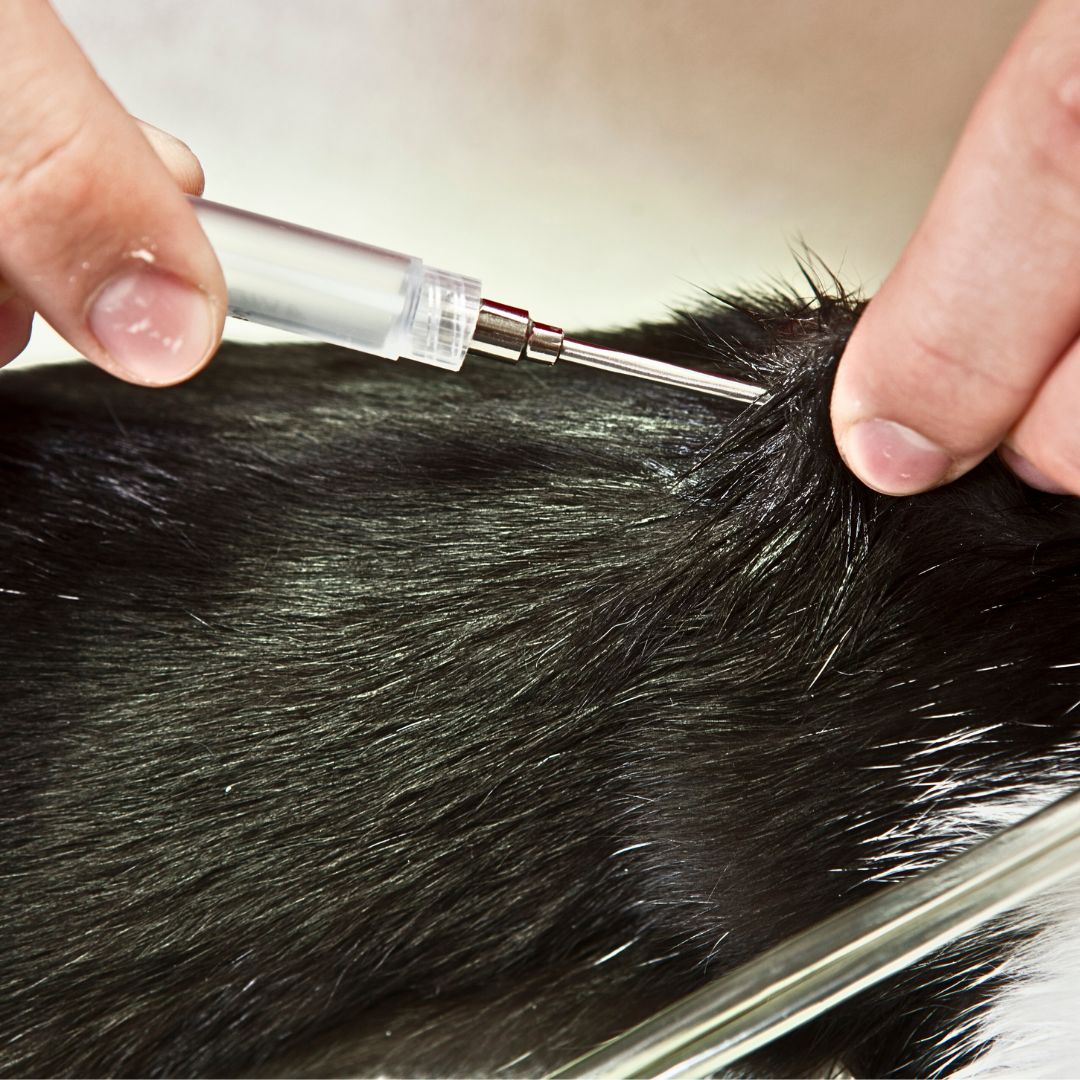Microchip Your Dog: Costs Explained in Canada Microchipping is a one-time cost that provides a permanent form of identification for your pet. It can greatly increase the chances of being reunited with your dog if they ever become lost or stolen.
Have you ever considered the price of your peace of mind? It’s about keeping your dog safe. We know the worry of possibly losing our dogs. Luckily, a tiny device implanted under their skin called a microchip helps track them if they get lost.
A pile of Canadian coins with a microchip implanted on top symbolizes the cost of pet microchipping in Canada.
This tiny device uses RFID technology. It’s small, about the size of a grain of rice, and carries information that animal hospitals and shelters can read. In Canada, it costs about $50 to microchip a dog. This includes the chip and the registration fee. Although most pet insurance plans, like Fetch Pet Insurance, don’t cover it, the sense of security it brings is priceless.
Let’s explore the pet microchipping cost. We’ll see why it’s important for every dog owner in Canada.
Key Takeaways
- Microchipping is a permanent way to ensure your dog can be tracked if lost.
- RFID technology within the microchip facilitates easy Identification by shelters.
- The average cost to microchip a dog in Canada is around $50.
- Pet insurance usually does not cover microchipping costs, but the investment enhances lifelong security.
- Microchipping is an essential step in responsible pet ownership.
The Importance of Microchipping Your Dog
Microchipping is key for your dog’s safety. It brings many benefits to both pets and their owners. By choosing dog microchipping Canada, your chances of finding your lost dog increase greatly.
Why Microchipping is Essential
Microchipping gives dogs a permanent ID, better than tags or collars that might get lost. If someone finds a lost dog, a quick scan of the microchip reveals the owner’s information, leading to a fast reunion. Getting your dog microchipped in Canada is easy and gives owners peace of mind.
Benefits of Microchipping
Microchipping your dog is a smart choice for many reasons. First, a microchip works for your pet’s whole life—it’s a one-off method for keeping track of them. Second, getting a microchip in Canada costs little. This is especially true when considering the stress and expenses of searching for a lost pet. Studies show that dogs with microchips are more likely to be returned to their owners. This fact proves how important microchipping is for pet safety.
What is a Microchip, and How Does It Work?
Understanding how pet microchips work helps us better protect our pets. These high-tech devices provide dogs with a lifetime ID, making it easier to find them if they get lost.
Understanding RFID Technology
Pet microchips work using RFID technology. This tech doesn’t need batteries, so it’s hassle-free. When scanned, the chip sends out an ID number. This number links pets to their owners through an online database, helping lost pets find their way home fast.
The Microchipping Procedure

Putting a microchip in a dog is simple and mostly painless. It’s done with a needle between the shoulder blades. The average cost to microchip a dog includes putting the chip in and registering it. Even though prices can change, the safety it brings is worth a lot. This ID lasts longer than others and only needs the occasional update on contact info.
This is a close-up view of a dog’s collar with a small, metallic microchip visible on it. The background is a blurred pet store with various pet supplies on display. The chip appears to glow with an electronic blue light, symbolizing the modernity and safety of the technology.
| Service | Average Cost to Microchip a Dog |
|---|---|
| Microchip Implantation | $30 – $75 |
| Registration Fee | $10 – $30 |
| Total Estimated Cost | $40 – $105 |
How Much Does It Cost to Microchip a Dog?
In Canada, microchipping a dog usually costs less than $100. This price includes the microchip, its placement, and the registration fee. The pet microchip price ensures the dog’s ID number is in a national registry, which connects the dog to the owner’s contact information.
Average Costs in Canada
The cost of dog microchipping ranges between $50 and $100. This cost covers the chip, its insertion, and adding your pet to a national database. While prices vary, this investment often brings owners a lot of relief.
Factors Affecting the Price
The overall pet microchip price can change based on a few things:
- Geographical Location: Prices can vary across provinces and even in rural versus urban areas.
- Provider: The price changes if a vet, animal shelter, or charity event is doing the microchipping.
- Additional Services: The cost may go up if the service includes things like lifetime registration or extra safety features.
Though most pet insurance plans don’t cover microchipping, some wellness plans may help with the cost of microchipping for dogs.
Cost Differences Across Canadian Provinces
Dog microchipping fees in Canada can vary greatly depending on the province. This shows the cost differences between cities and the countryside. Urban places often face unique economic factors that affect prices.
Local laws also affect the cost of dog microchips in Canada, which shows the country’s focus on pet safety and ownership.
A group of dogs of different breeds sits on a map of Canada, each wearing a collar indicating its province. The collars have price tags indicating the microchipping cost in each province. The dogs look up curiously at a magnifying glass above the map, symbolizing the viewer zooming in to compare prices.
Comparing Urban and Rural Costs

The cost of dog microchips in urban and rural Canada is quite different. In big cities like Toronto and Vancouver, prices tend to be higher. This is due to higher vet fees and living costs.
In the countryside, prices might be lower. But, finding these services might be challenging.
Microchipping Laws and Regulations
The rules in different provinces also affect microchipping prices. For example, in Montreal, all dogs need a microchip for their license. This law highlights the focus on pet safety and ownership.
These rules help make pet safety measures standard. However, they allow prices to change by province.
Low-Cost and Free Microchipping Options
If you’re a pet owner looking for low-cost microchipping, you’re in luck. Many options are available to help make this important service more affordable. This means all families can keep their pets safe without breaking the bank.
Animal Shelters and Rescue Organizations
Animal shelters and rescue groups in Canada often offer low-cost microchipping for dogs. They want to ensure it’s affordable and helps lost pets find their way home safely.
Charity Events and Clinics
Charity events and mobile clinics also provide cheap or free microchipping. Attending these events can save you money, so no pet owner has to skip microchipping due to cost.
Using these dog microchipping services in Canada gives your dog a permanent ID, which boosts the odds of a happy reunion if it ever gets lost.
Veterinarian Microchip Services

In Canada, veterinarian microchip services are top-notch and convenient. The process is simple and can be done during a regular check-up, ensuring your pet feels only slightly uncomfortable. But what happens when you take your dog for microchipping?
A furry dog is being scanned by a microchip reader in front of a Canadian flag, with a veterinarian’s arm holding the reader. The dog looks calm and relaxed while getting scanned. The background shows a veterinary clinic with other pets waiting for their turn for microchipping. The image has a friendly and professional vibe, bright colours and clear details.
What to Expect at the Vet’s Office
Dog microchipping in Canada at the vet is fast and smooth. A hypodermic needle places the microchip under your dog’s skin, usually between the shoulders. It feels much like getting a regular shot. After that, the vet will help sign up the microchip. They ensure your details are immediately linked to the chip’s ID number.
Pros and Cons of Vet Microchipping
Microchipping your dog at the vet has many pros and a few things to consider. Here’s what you need to know:
- Professional Handling: A trained professional performs the microchipping. This means it’s accurate and safe.
- Immediate Registration: Vets usually help with immediate registration, which allows your pet’s information to enter the database quickly.
- Cost: Vet microchipping might cost more than other options. People often wonder how much it costs to microchip a dog in Canada. Prices differ, but vets usually charge more.
- Comfort: The process is mostly painless. Still, talking to the vet about pain relief can help your dog stay comfortable.
Knowing the pros and cons helps you choose dog microchipping services in Canada. Considering these aspects and the security of having a microchipped pet is smart.
The Risks and Safety of Microchipping
Microchipping dogs in Canada is safe, yet it does have some risks. The cost often includes implantation and the promise of few complications. We will look at concerns and expert views for a clearer picture of its safety.
Common Concerns and Misconceptions
Many dog owners worry about microchip movement or infection. True, these are rare but possible issues. The cost of a dog microchip in Canada reflects the high standards and quality of materials used to lower these risks. Fortunately, negative reactions are very uncommon, making microchipping a trusted way to identify pets.
Expert Opinions on Safety
Vets often say the advantages of microchipping outweigh any risks. Groups like the Canadian Veterinary Medical Association support it for its proven safety and usefulness. Its risk is very low, giving owners the confidence to microchip their dogs.
Microchips vs. GPS Collars
Choosing between microchips and GPS collars for your dog’s safety can be tough. Each has benefits and drawbacks that you should consider. It will help you make a choice that’s best for your pet.
Pros and Cons of Each Option
- Microchips: Permanent and tamper-proof Identification
- Low maintenance, no batteries required
- Relatively inexpensive (microchip for dogs Canada price is around $50)
- Requires a scanner to read the information
- GPS Collars: Real-time location tracking capabilities
- Useful for active dogs that travel or roam frequently
- More expensive than microchips
- Requires regular recharging and reliable cell service
Which is Right for Your Dog?
Choosing between a microchip and a GPS collar depends on your dog’s activity, preference, and budget. The microchip for Dogs Canada’s price is more affordable and perfect for permanent ID. But GPS collars offer real-time tracking, which is ideal for pets that explore a lot. Using pet microchip services and GPS collars for dogs provides maximum safety for your pet.
| Aspect | Microchip | GPS Collar |
|---|---|---|
| Cost | Lower (microchip for dogs Canada price) | Higher |
| Maintenance | None | Regular recharging |
| Tracking | Identification only | Real-time location |
The Lifetime Value of a Microchip
Microchipping your dog brings many lasting benefits. It’s a wise investment for your pet’s safety and peace of mind. A microchip is a permanent ID that connects to a national database, which is key if your pet gets lost.
Long-Term Benefits
The benefits of microchipping last a lifetime. Once in place, the chip needs no further costs. The microchip for dog cost is a small price for lifetime security. If your pet wanders off, the chip helps bring them back safely. Also, the pet microchip cost is worth it for the peace of mind it brings, something no collar or tag can match.
Maintaining Up-to-Date Information
While the chip needs no upkeep, updating your contact info is key. You can do this easily online. Keeping your details current is essential to use the chip effectively. If you move or get a new phone, update your info immediately.
In short, the cost of a microchip for a dog is a minor investment with major returns. It ensures your dog’s safety and gives owners peace of mind.
Pet Insurance and Microchipping Costs

Dog owners often ask if pet insurance covers microchipping costs. Most basic plans focus on unexpected sickness and injury. However, some, like Fetch by The Dodo, include wellness plan coverage for microchipping in their preventive care.
It’s wise for pet owners to look closely at their insurance choices. It helps them find options that cover pet insurance microchipping. It can save Canada residents money for dog microchip implant costs when microchipping their pets.
Also, pet owners should check out local microchipping events. These can offer the service at low cost or even for free. This makes it easier and cheaper to keep pets safe. Smart pet parents use insurance and clinic services together to protect their dogs affordably.
Insurance Provider Core Coverage Wellness Plan Add-On Microchipping Included
| Insurance Provider | Core Coverage | Wellness Plan Add-On | Microchipping Included |
|---|---|---|---|
| Fetch by The Dodo | Yes | Yes | Yes |
| Trupanion | Yes | No | No |
| Healthy Paws | Yes | No | No |
Conclusion
Microchipping your dog is a key step for being a responsible pet owner in Canada. It provides a permanent way to identify your pet, meaning a better chance of getting it back if lost. We have looked into the costs, how it’s done, the risks, and insurance options for microchipping.
The cost of microchipping your pet can vary, but it’s worth every penny for the peace of mind you get. Microchips last a long time and work better than other ways to ID your pet, making them crucial for your pet’s safety. No matter where you live or what the rules are, getting your dog microchipped is a smart move for both of you.
If you’re travelling or thinking about local laws, a dog with a microchip is safer and more likely to find its way back home. Knowing all about microchipping, its costs, and your insurance choices keeps our pets safe. Microchipping our dogs protects them and gives us a sense of safety and relief.
FAQ
What does it cost to microchip a dog in Canada?
In Canada, microchipping a dog generally costs around $50. This price includes the chip’s implantation and registry fees. However, the location and who microchips the dog can change the cost.
How important is it to microchip my dog?
Microchipping your dog is very important for its safety. If your dog gets lost, a microchip boosts the chances of reuniting. Microchips last longer than collars and tags, offering a lasting ID.
What technology does a pet microchip use?
Pet microchips use RFID technology, are tiny, are the size of a grain of rice, and transmit a special ID number when scanned. This connects your dog back to you through an online registry.
How is a microchip implanted in my dog?
Implanting a microchip is quick and mostly painless. It doesn’t need anesthesia. A vet injects the chip with a needle between the dog’s shoulder blades.
Are there risks associated with microchipping my dog?
The risks, like microchip movement or injection site infection, are uncommon. The safety benefits of microchipping outweigh these small risks.
How do microchip costs vary across Canada?
Microchipping prices change across provinces and between cities and the countryside. In some places, laws requiring microchipping also affect the cost.
Are there affordable microchipping options available?
Many shelters, rescues, and events offer low—or no-cost microchipping, which helps ensure the safety of more pets.
What are the advantages of having a vet microchip for my dog?
Vets ensure the microchipping is done correctly and help with the instant registry. Although it might cost more, it’s usually done during a regular vet visit.
What are the pros and cons of microchips vs. GPS collars?
Microchips are a permanent, no-upkeep way to keep your dog ID’d, while GPS collars track your dog but need charging and a cell plan. The best choice depends on your dog and how you live.
How does microchipping provide long-term value?
Microchipping is a one-time, lifetime pet ID solution. Updating your information means your lost pet can quickly return home, giving you peace of mind.
Does pet insurance cover microchipping costs?
Basic pet insurance usually doesn’t cover microchipping, as it’s preventive. But, some plans offer wellness additions that do cover it.




Leave a reply